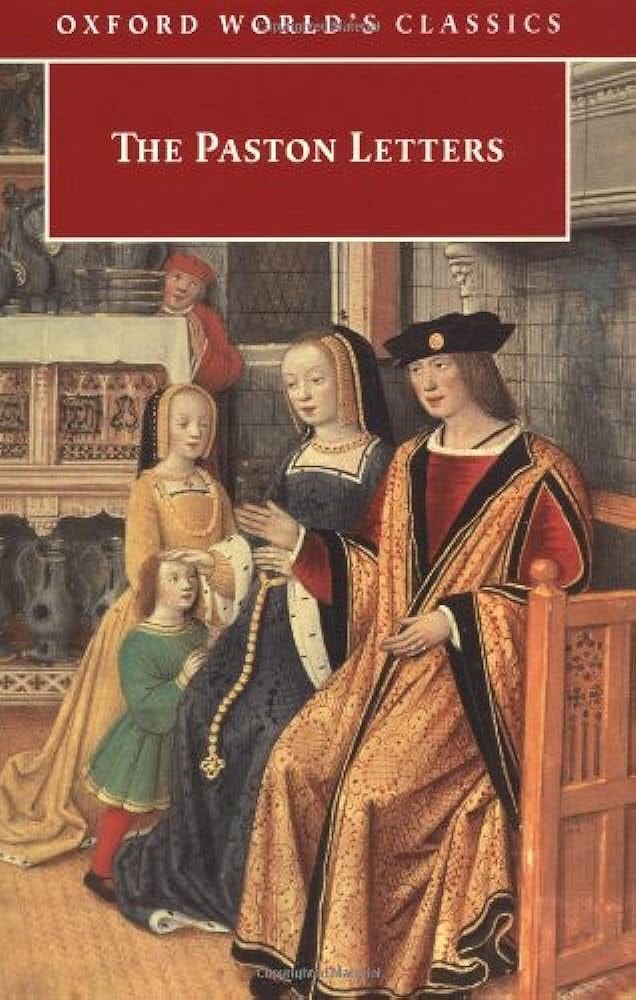Christine, and her relationship with The Paston Letters: A Selection in Modern Spelling (1999), a paperback copy of which sits on our shelf. The website Thriftbooks offers this as an overview: “A collection of letters preserved by the Pastons, a well-to-do Norfolk family, written between around 1420 and 1504. They offer evidence for the language of the time and show the contemporary historical, political and social interests. Three generations of the family appear.” From how Christine tells it, they were a family of means that aimed to move higher up the social order across a couple of generations, until the last remnants of the family’s daughter ran off with the estate manager. As Christine’s fourteenth great grandmother, in the bounds of these letters, at least, called Christine’s thirteenth great grandmother a harlot. And that was the end of that.
Perhaps oversimplifying, but only a bit. This is a family line that includes Sir John Paston (1442-1479), who had frequented the court of Edward IV, but later fought at the Battle of Barnet for Henry VI alongside his younger brother, also named John, thus participating in one of the decisive final battles of the War of the Roses. Were the Pastons so low on names to include two with the same in a single generation of children? There was Sir William Paston (c. 1479-1554), a regular at the court of Henry VIII. It would appear that this family was rich with knights, as well as another that married the daughter of Charles II. This was a family that did business with Sir John Fastolf (1380-1459), a man said to be the prototype for William Shakespeare’s fictional Sir John Falstaff, a character that appeared in Henry IV, Part 1 and Part 2, as well as The Merry Wives of Windsor. As history speaks of the men, Christine’s attention catches on those other stories: the stories of women. The stories history so often overlooks.
“The little village of Paston, in Norfolk, lies not far from the sea,” James Gairdner writes, to introduce the family as part of The Paston Letters: A.D. 1422-1509: Volume 1 (1904), “where the land descends gently behind the elevated ground of Mundesley, and the line of the shore, proceeding eastward from Cromer, begins to tend a little more towards the south. It is about twenty miles north of Norwich. The country, though destitute of any marked features, is not uninteresting. Southwards, where it is low and flat, the ruins of Bromholm Priory attract attention. But, on the whole, it is an out-of-the-way district, unapproachable by sea, for the coast is dangerous, and offering few attractions to those who visit it by land. Indeed, till quite recently, no railways had come near it, and the means of access were not superabundant. Here, however, lived for several centuries a family which took its surname from the place, and whose private correspondence at one particular epoch sheds no inconsiderable light on the annals of their country.”
Years ago, Canadian poet John Barton offered at an Ottawa reading the detail that Field Marshal George Townshend (1724-1807), a man who fought at the Battle of Culloden and took command of the British forces for the closing stages of the Battle of the Plains of Abraham, married into his father’s family. The late Ottawa poet Lesley Strutt (1953-2021) long held in her author biographies that she a descendant of Bytown poet and City Clerk William Pittman Lett (1818-1892), an Irish-born pre-Confederation poet who was known as the “Bard of Bytown,” before Bytown had been re-christened as Ottawa in 1854. His father, Captain Andrews Lett, was a veteran of the 28th Cameronian Regiment of Foot and a pioneer of the United Empire Loyalist settlement of Richmond, a man who followed along that path on the Grand (Ottawa) River from what became Richmond Landing along what became Richmond Road, all the way to help found the village named for their British North American Governor General, Charles Lennox, 4th Duke of Richmond (1764-1819).
When William Pittman Lett, cited more recently as the ‘poet blogger of Victorian Ottawa’ by the Ottawa Citizen, died in 1892, he was offered a fully-paid public funeral. His name was a regular thread in Lesley’s author biographies, although when I spoke to her daughter, Dee, of the Ottawa band The Peptides, after Lesley died, she was neither aware of Pitt’s name nor the family connection. What does it mean? Does it mean anything? For Lesley, perhaps, Pitt was an influence, a connection. Pitt was a prompt. If he could do this, she might have told herself. He, too, did this.
Such distance implies no direct influence, but for what we might seek out, or bring.
Perhaps Christine would, too, run off with the estate manager. In this scenario, am I the estate manager?




